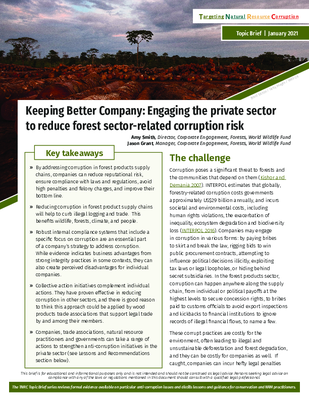Keeping Better Company: Engaging the private sector to reduce forest sector-related corruption risk

Corruption poses a significant threat to forests and the communities that depend on them. By addressing corruption in forest products supply chains, companies can reduce reputational risk, ensure compliance with laws and regulations, avoid high penalties and felony charges, and improve their bottom line. This topic brief sets forth recommendations for approaches these stakeholders can take in the fight against corruption.
Key Takeaways
- By addressing corruption in forest products supply chains, companies can reduce reputational risk, ensure compliance with laws and regulations, avoid high penalties and felony charges, and improve their bottom line.
- Reducing corruption in forest product supply chains will help to curb illegal logging and trade. This benefits wildlife, forests, climate, and people.
- Robust internal compliance systems that include a specific focus on corruption are an essential part of a company’s strategy to address corruption. While evidence indicates business advantages from strong integrity practices in some contexts, they can also create perceived disadvantages for individual companies.
- Collective action initiatives complement individual actions. They have proven effective in reducing corruption in other sectors, and there is good reason to think this approach could be applied by wood products trade associations that support legal trade by and among their members.
- Companies, trade associations, natural resource practitioners and governments can take a range of actions to strengthen anti-corruption initiatives in the private sector (see Lessons and Recommendations section below).


